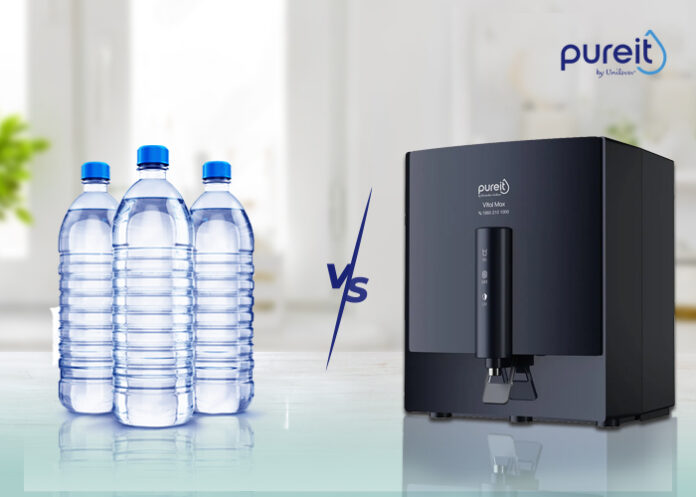It might seem an easy and hassle-free way to get a water jar or bottled water as a steady mode of consumption. But, in the long run, is it efficient? You probably drink more water than you think. Water is consumed not only when a glass of water is consumed. Cooking, drinking beverages with ice, coffee, tea, and other water-based beverages all use drinking water. Here is a detailed comparison between Bottled Water vs RO water to give a fair idea for making the right choice.
Bottled Water vs RO Water
Bottled water is the safest option and is in high demand due to its convenience. Many people, however, are considering alternatives due to environmental and ethical concerns. On the other hand, an RO water purifier provides the same taste and cleaner water as compared to bottled water, making it just as safe. It is also cost-effective and environmentally friendly because it does not generate plastic waste.
Water from a city or well source may still have contaminants that are harmful to human consumption. Purifying the water that will be consumed thoroughly is an excellent way to promote a healthy lifestyle.
A Detailed Comparison
If purchased, the initial cost of RO water filtration can be high, and filter maintenance is required. However, if a RO water purifier system is installed, the cost will be significantly lower than purchasing bottled water.
Bottled water typically employs one or more of the following filtration processes: distillation, UV filtration, micron filtration, ozonation, and, in some cases, reverse osmosis. However, the process and water quality cannot be guaranteed. Bottled water is in high demand due to its convenience and portability. Most people prefer bottled water (which is readily available) over tap water because they want to ensure that they are drinking filtered and contamination-free water. It is regarded as one of the safest and cleanest alternatives to other types of drinking water.
Apart from all these benefits, the cons of bottled water are on the heavier side. Many studies and documentaries have been produced that show how the bottled water industry has privatized an essential resource that should be available to everyone. Water as a commodity for profit has an impact on those who live in remote and rural areas. It limits their access to essential resources and human rights.
Cost on the Environment
Plastic is one of the most significant contributors to environmental pollution. Despite the fact that plastic is recyclable, approximately 80% of plastic water bottles are not recycled. There are millions of plastic bottles that end up as litter, and an estimated 60 million bottles that end up in landfills in the United States alone. It takes 700 years for the water bottle to decompose. Water bottles are a major source of single-use plastic waste. Taking conscious steps towards the environment, a water purifier is a safer choice like the Pureit Max Water Saver Water Purifier which saves a minimum of 2.5 glasses for every 1 glass of purified water which is 80% higher than any regular RO purifier.
The purifier is capable of reducing TDS levels of up to 2000 ppm and also treating water from various sources, including borewells, taps, and tankers.
Economical Aspect
Lastly, coming to the cost- water bottles are an expensive source of purified water. Many people drink water from water bottles but cook and wash their clothes with tap water. But then, consider what you’re allowing into your body, contaminants in water do not enter your body solely through drinking water. An average household uses 29 billion gallons of water on average. That is a lot of water, especially when bottled water is used, which is why it is so expensive.
The Right Choice
A reverse osmosis water filtration system provides bottled water without the bottle in your home. A RO water purifier is simple to install in your home and can filter your water under the sink or alongside your water tank. The RO system uses high pressure to force water through a semipermeable membrane, resulting in filtered and contaminant-free water.
Neutral Testing Water
One of the most significant advantages of RO water is that it has no unpleasant odour. As you may have noticed, tap water has a peculiar odour. The odour is caused by chlorine, which the government adds to the city’s water to kill bacteria. RO filtration removes chlorine as well as other contaminants. This ensures there is no odour when drinking the water. Many bottled water businesses sell filtered tap water. A RO water purifier will provide you with the same filtered tap water in your home at your leisure.
Healthier Choice
Filtered water eliminates harmful chemicals and particles found in tap water. Tap water is typically water from lakes and rivers that have been contaminated by herbicides and pesticides washed into them by rain. For example, the Pureit Vital Max with FiltraPower Technology is capable of eradicating viruses, bacteria, cysts, toxins, pesticides, etc. With an advanced 7-Stage Purification Process of RO+UV, every drop of water you drink from Pureit Vital is sweet and always safe!
Instant Water Dispensing
The RO filtration system allows you to have filtered water whenever you need it. You don’t have to buy it ahead of time, stock up on it, or buy it in bulk. It can be accessed by simply pushing a lever or button. You can fill jugs or pitchers to use at parties and use reusable bottles to take with you on the go.
Ending Note
When you have the comprehensive knowledge that RO water purifier overtakes bottled water in terms of water quality, it outperforms bottled water in terms of sustainability by not using single-use plastics, and it costs significantly less than bottled water – the choice is clear.















